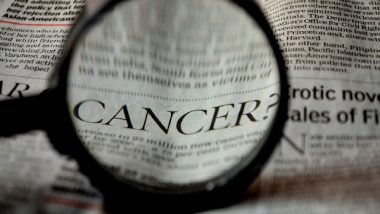California, December 3: The City of Hope researchers have identified a pathway that explained how mutated cancer cells can continue to replicate and become resistant to oncology therapies.
The study has been published in the 'Science Journal'. Also Read | Tadap Movie Review: Ahan Shetty and Tara Sutaria Kiss But Don't Make Up in a Love Story More Toxic Than the Delhi Air (LatestLY Exclusive).
Using whole-genome sequencing technology, the scientists discovered a new mechanism for how genetically defective cells mutated to survive stressful situations, such as drug treatment. Understanding this resistance mechanism moved researchers one step closer to developing new strategies to prevent cancer development or to delay and overcome resistance to cancer drugs. Also Read | Cristiano Ronaldo Smirks at Fans After Old Trafford Goes Berserk Chanting His Name Post 800th Goal During Manchester United vs Arsenal, EPL 2021-22.
"Targeted cancer therapies have transformed cancer care and prolonged patient lives, but many patients eventually develop resistance to their lifesaving treatments. Our basic research hints at how we might one day be able to increase survival by delaying or even preventing the development of cancer drug resistance," said Binghui Shen, PhD, professor and chair of the Department of Cancer Genetics and Epigenetics at Beckman Research Institute of the City of Hope.
Shen has been conducting research on the fundamental mechanisms of DNA replication and the key enzyme called flap endonuclease 1 for the past 25 years at the City of Hope. This finding, Shen said, is a milestone moment.
The study was conducted in yeast, mouse and human leukaemia models. As a next step, Shen's team will see if they can replicate the discovery in more varied human cancer cells and establish regimens to overcome cancer drug resistance.
(The above story is verified and authored by ANI staff, ANI is South Asia's leading multimedia news agency with over 100 bureaus in India, South Asia and across the globe. ANI brings the latest news on Politics and Current Affairs in India & around the World, Sports, Health, Fitness, Entertainment, & News. The views appearing in the above post do not reflect the opinions of LatestLY)













 Quickly
Quickly


